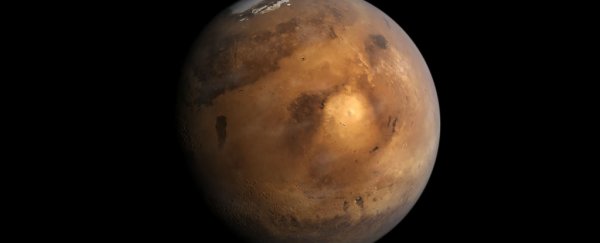When it comes to planning manned missions to Mars, we've been so preoccupied with how to ferry humans 225 million km through the Solar System, that we might be missing a really serious problem - are we sending astronauts to the Red Planet to have their brains fried?
A new study based on mice has found that the amount of cosmic rays expected to bombard astronauts during this extended trip could lead to severe cognitive side effects that will stick around long after they've returned to Earth, including memory loss, anxiety, and chronic dementia.
The study follows similar research published last year that suggested the damage from galactic cosmic rays (GCRs) - particles with immensely high-energy radiation that travel through space at nearly the speed of light - can damage the brain, but only in the short-term.
Now researchers have evidence to suggest that even six months after returning from an extended spaceflight, astronauts could still be experiencing significant levels of brain inflammation and neuron damage.
"This is not positive news for astronauts deployed on a two-to-three-year round trip to Mars," said one of the team, Charles Limoli, a radiation oncology professor at the University of California, Irvine.
"Exposure to these particles can lead to a range of potential central nervous system complications that can occur during and persist long after actual space travel - such as various performance decrements, memory deficits, anxiety, depression, and impaired decision-making," he said.
"Many of these adverse consequences to cognition may continue and progress throughout life."
Just to put galactic cosmic rays into perspective, they're such a huge problem for long-term spaceflight because they can easily penetrate the hull of a spaceship, so you can imagine what they can do to a person's brain when they're penetrating it non-stop for weeks on end.
Astronauts in the International Space Station are protected from this kind of damage, because they're still protected by Earth's magnetosphere.
Limoli and his team tested the effects of cosmic radiation on mice that had been exposed to low doses at the NASA Space Radiation Laboratory in New York. They were then given several behavioural tasks to complete 12 and 24 weeks after the irradiation period.
They found that the mice progressively displayed poor performance on tasks designed to test learning and memory in humans, and even appeared to affect the animals' 'fear extinction' - a decline in conditioned fear responses caused by the brain suppressing negative or stressful associations or memories.
The researchers suggested that the decline in fear extinction is what led to the elevated anxiety they recorded in the mice.
"These new data reveal additional detrimental effects related to fear extinction and anxiety, where charged particle irradiation compromises the ability to dissociate adverse events and outcomes," the team reports.
"The inability to moderate reactions to certain unpleasant stimuli could elicit elevated stress, anxiety and otherwise disadvantageous responses in unexpected or emergency situations."
Just like the results from last year's experiment, the mice had also slower response times, were forgetful, and sometimes even appeared to be confused - symptoms of the progression of chronic dementia.
Brain scans taken six months after exposure backed up these findings, revealing significant levels of brain inflammation and damage to neurons.
The researchers explain that the neural networks in the mouse brains were impaired through the reduction of structures called dendrites and spines on the neurons, which disrupts the transmission of signals among brain cells.
They linked this physical damage to the increase in cognitive impairments displayed by the mice after cosmic radiation exposure.
What's perhaps even more concerning is the fact that the researchers think the signs won't be so obvious in astronauts until about the six-month mark, which could be devastating for our prospects of colonisation.
Of course, we should reiterate that these effects have so far only been found in mice, and there's no guarantee that they will be replicated in humans.
But it wouldn't be such a surprise if something similar does befall the brave souls who volunteer to be on the first manned spacecraft to the Red Planet, because as astronaut Tim Peak recently said of his six-month stay on the International Space Station:
"[T]o be quite frank, you feel pretty terrible. It can only be described as something akin to the world's worst hangover in terms of the everything that is going on in your head."
And Peak had the protection of Earth's magnetosphere that whole time.
It'll be a phenomenal achievement if scientists can figure out how to get us to Mars in mere days, but knowing how to protect our colonies from long-term space exposure will be even more impressive.
The research has been published in Scientific Reports.
